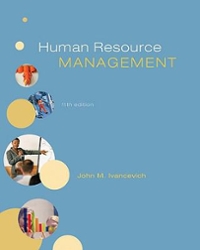Experts agree that over 70 percent of all illicit drug users in the U.S. are employed. A
Question:
Experts agree that over 70 percent of all illicit drug users in the U.S. are employed. A Gallup survey of employees found that 37 percent of all respondents said that workplace drug use problems had increased in the last five years. A majority supported drug screening tests.
In two short months, top management at Castulon Corporation realized that the company had employees who might have a problem with drug abuse. In October, an electronics engineer was found at his desk clearly stoned ("He literally fell off his chair," the engineer's supervisor said). In November a security guard discovered two employees in the company parking lot during the lunch hour, snorting cocaine in a car. All three employees were fired. Bob McRary, CEO of Castulon Corp., was particularly disturbed by these incidents.
Castulon manufactures electronic systems that monitor and control the levels of hazardous chemicals at industrial plants. Any mistakes made by drug-dependent employees in the design or production of a system could provide disastrous results for users.
McRary assigned Michael O'Brien, vice president of human resources, the task of writing a proposal for a drug-testing program for job applicants and for Castulon's 600 employees. The proposal would recommend procedures for establishing a program and propose the program's content. The proposal would also present a comprehensive coverage of the pros and cons of establishing drug testing at Castulon. Undecided, McRary wanted to review all sides of the question before making a decision.
Michael O'Brien sought the help of Norman Sterling, director of employee relations, and Beverly Shaver, director of employee recruitment and selection, in preparing the proposal. As he often did when handling difficult issues, O'Brien asked each director to assume one position-either for or against mandatory drug testing-and to prepare a 10-page position paper presenting his or her views, based on research and a thorough consideration of the issues at hand. O'Brien would use the papers as input for the final proposal.
Today, Norman Sterling (who chose the advocate's position) and Beverly Shaver (who selected the opponent's view) submitted their papers to O'Brien. Now, in O'Brien's office and at his request, the two managers are discussing their positions.
"I accepted this assignment initially supporting a drug-testing program, and after considering the issues, I'm even more convinced that we need one, for three primary reasons," Norman Sterling asserted.
"First, we have a responsibility for providing a safe workplace for our employees, and any drug use on the job compromises safety," he continued. "There's no question that drug use results in more accidents on the job. One study that compared employees who use drugs with nonusers found that an employee who uses drugs is almost four times more likely to be involved in a job-related accident.
Questions
1. Should Castulon Corporation establish a drug-testing program? If so, recommend a specific policy for the program that includes disciplinary procedures for dealing with employees who test positive for drug use.
2. What are the most difficult challenges facing an organization in establishing a drugtesting program? Discuss.
3. Some observers assert that, since alcohol abuse is more prevalent in the workplace and its effects are just as costly, companies should also test for alcohol use. Do you agree? Explain.
Step by Step Answer:






